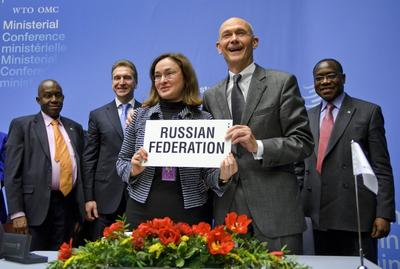Images of Russia acceding to the WTO as the 154th member was heralded as one of the major successes in the 8th Ministerial Conference, which otherwise was considered a failure.

A piece in the EastAsiaForum by a Professor in the Russian Academy of Sciences highlights the trade offs as well as sectoral impact the WTO would have on Russia's economy. The highlights:
"Russia’s forestry and car industries are likely to be especially impacted. As WTO membership requires maximum duties on unprocessed timber to be reduced from the current 25 per cent to 15 per cent, the forestry industry will find it increasingly hard to compete. Products such as paper, for example, will be cheaper to import than to produce until the industry becomes more efficient. And from 2012, Russia’s car industry will no longer be able to depend on state subsidies or the protection it receives from duties imposed on imported cars. Similarly, foreign investors will have less incentive to relocate production facilities to Russia in exchange for customs exemptions.
The WTO’s emphasis on trade liberalisation will have a large impact on Russia’s insurance and banking industries as well. In four years, foreign insurance companies will be allowed to sell compulsory insurance and life insurance products to the Russian public, and in nine years these companies will be allowed to establish branches in Russia. This will help diminish the monopoly that Russia’s banks and insurance companies currently enjoy.
In addition to the sceptics, there are also optimists who believe that joining the WTO will benefit Russian consumers. Prices of industrial consumer goods, such as electronics and furniture, will drop and pharmaceutical drug prices are estimated to decrease by 5-10 per cent. Russian consumers can also look forward to cheaper mobile phone services as foreign telecommunication companies enter the Russian market from 2015. At the same time, joining the WTO will boost key segments of Russia’s economy as foreign markets are opened to Russian products like grain, transport, tourism, construction and engineering
The impact of Russia’s accession to the WTO will be softened by a phased approach to trade liberalisation. In particular, the average import duty in Russia will fall from 10.3 to 7.1 per cent, including for agricultural products — from 15.6 to 11.2 per cent, and industrial — from 9.4 to 6.4 per cent. The Government will continue to regulate domestic prices for gas Russia has three years to reduce tariffs by a quarter, but longer periods are allowed for specific goods. Also, if tariff reductions result in substantial losses for a particular industry, the WTO rules allow the use of special protective measures to limit such imports for a period of between five and seven years."
Membership of the WTO and its resultant impact on the domestic economy is a complex phenomenon. While some sectors will be greatly benefited, the impact of trade liberalisation on certain sectors domestically can be devastating. Understanding the sectoral impacts is essential to formulate a policy, consistent with WTO obligations, to strengthen domestic industry to compete in the global world. Also understanding different stakeholders in the Russian economy - consumers, domestic producers, domestic importers, Government - will provide insights into the impact of WTO on a domestic economy's interests.
Giving a thumbs up to Russia's entry into the WTO, it concludes,
"Overall, WTO membership should encourage Russian companies to produce more competitive products, and the growth in international trade will create thousands of new jobs. But how quickly and effectively Russia will implement reforms in accordance with the WTO’s required standards is unknown. This is because the WTO rules are vastly different to the ‘manual’ methods of economic management currently used in Russia. Still, it is clear that WTO membership will foster institutional change, helping Russia contribute more directly to the development of rules in the global markets. In turn, this will spur Russia’s integration with Belarus, Kazakhstan and Kyrgyzstan through the Eurasian Customs Union and Common Economic Space. This should also accelerate Kazakhstan and Belarus’ accession to the WTO.
The benefits of Russia’s WTO membership will only become fully apparent in the long run. In the short to medium term, it is likely that Russia’s entry into the WTO will disappoint some sectors of Russian society, as its effects are slow to take off. But, until recently, Russia was the only country in the G20 that was not a WTO member and such a step is necessary if Russia wants to maintain a strong position in the global economy. And without active participation in international trade, it will be impossible for Russia to achieve the radical modernisation it so desperately needs."
No comments:
Post a Comment